Farmers busy with harvesting, processing spring tea in SW China's Guizhou
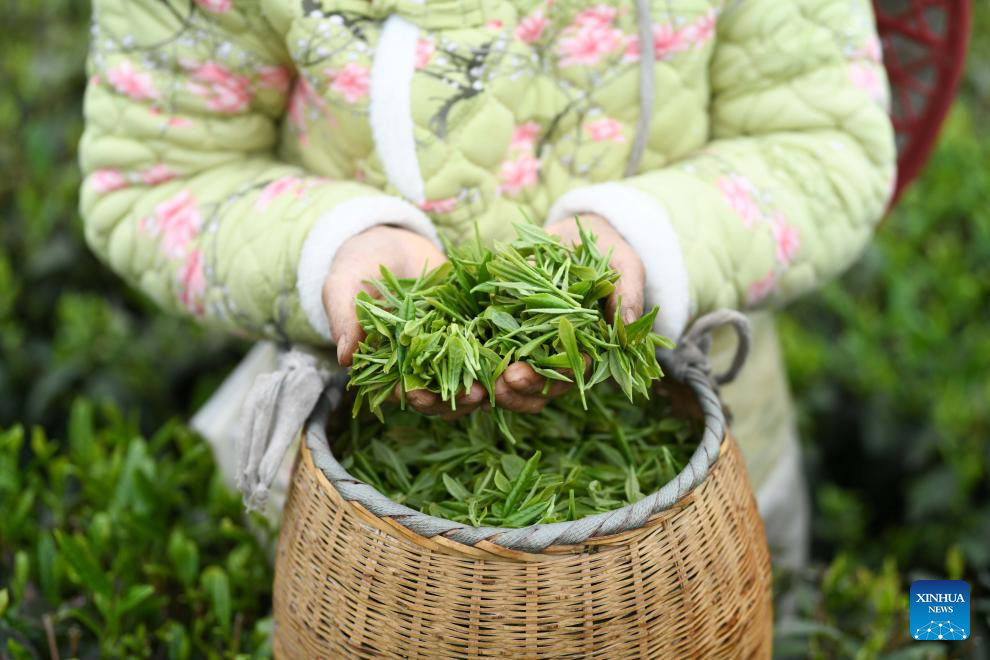
A farmer shows fresh tea leaves at a tea garden in Erlong Village in Yuqing County, southwest China's Guizhou Province, April 5, 2024. During the Qingming Festival, tea farmers are engaged in the bustling activity of harvesting and processing spring tea in Yuqing County.
In recent years, Yuqing County has strategically positioned the tea industry as its pillar industry. Measures such as expanding cultivation areas, introducing processing enterprises, and extending the industry chain have been implemented to drive rural revitalization.
The efforts have yielded significant results, with the total area of tea plantations in Yuqing County now reaching 213,000 mu (approximately 14,200 hectares). More than 80,000 villagers have directly benefited from tea-related businesses with income increased. (Photo by Wang Chao/Xinhua)
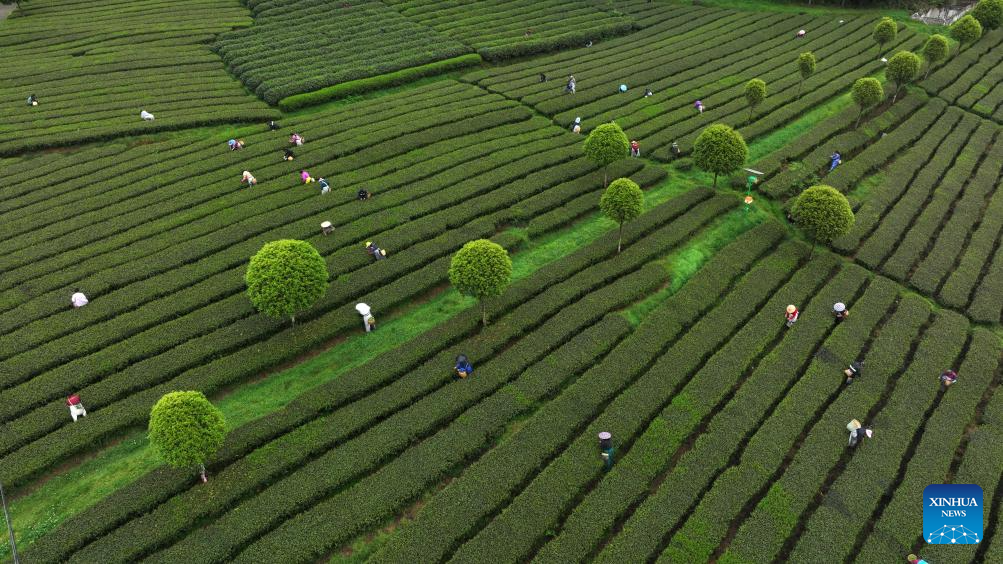
An aerial drone photo shows farmers picking tea leaves at tea gardens in Erlong Village in Yuqing County, southwest China's Guizhou Province, April 5, 2024. During the Qingming Festival, tea farmers are engaged in the bustling activity of harvesting and processing spring tea in Yuqing County.
In recent years, Yuqing County has strategically positioned the tea industry as its pillar industry. Measures such as expanding cultivation areas, introducing processing enterprises, and extending the industry chain have been implemented to drive rural revitalization.
The efforts have yielded significant results, with the total area of tea plantations in Yuqing County now reaching 213,000 mu (approximately 14,200 hectares). More than 80,000 villagers have directly benefited from tea-related businesses with income increased. (Xinhua/Yang Ying)
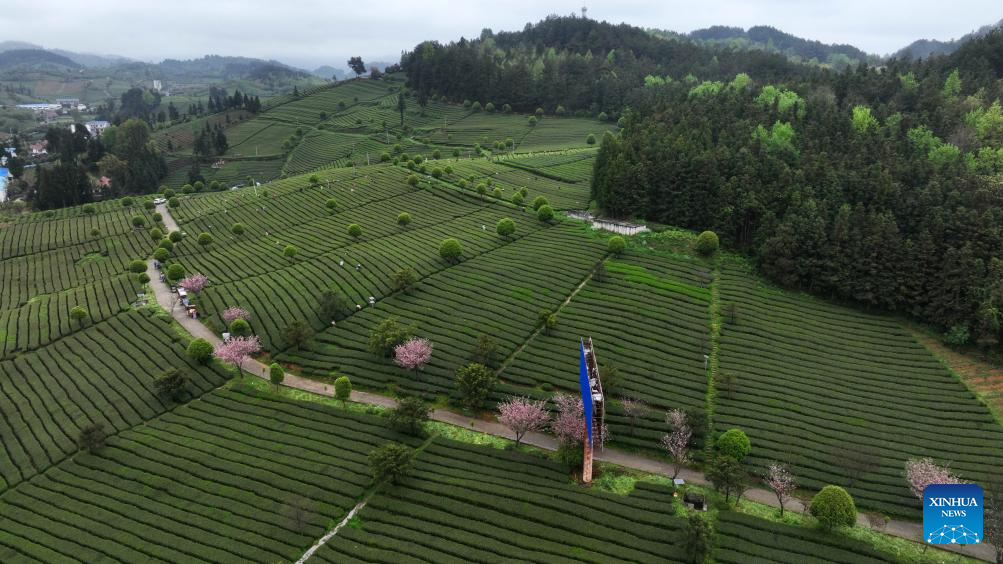
An aerial drone photo shows farmers picking tea leaves at a tea garden in Erlong Village in Yuqing County, southwest China's Guizhou Province, April 5, 2024. During the Qingming Festival, tea farmers are engaged in the bustling activity of harvesting and processing spring tea in Yuqing County.
In recent years, Yuqing County has strategically positioned the tea industry as its pillar industry. Measures such as expanding cultivation areas, introducing processing enterprises, and extending the industry chain have been implemented to drive rural revitalization.
The efforts have yielded significant results, with the total area of tea plantations in Yuqing County now reaching 213,000 mu (approximately 14,200 hectares). More than 80,000 villagers have directly benefited from tea-related businesses with income increased. (Xinhua/Yang Ying)
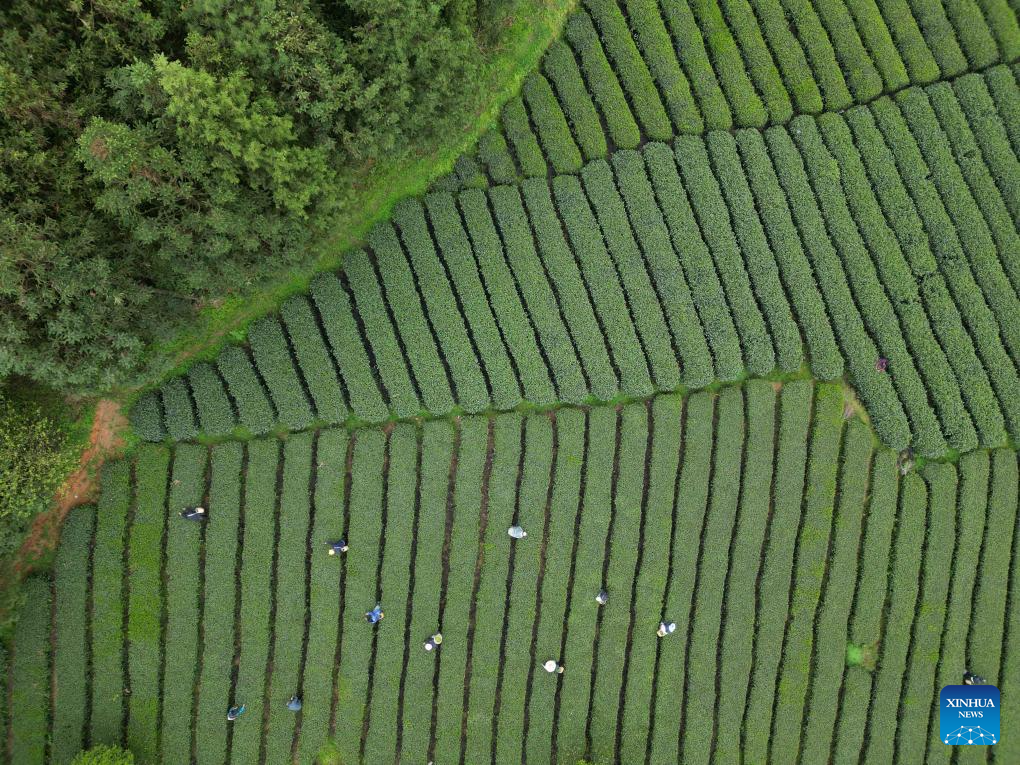
An aerial drone photo shows farmers picking tea leaves at a tea garden in Erlong Village in Yuqing County, southwest China's Guizhou Province, April 5, 2024. During the Qingming Festival, tea farmers are engaged in the bustling activity of harvesting and processing spring tea in Yuqing County.
In recent years, Yuqing County has strategically positioned the tea industry as its pillar industry. Measures such as expanding cultivation areas, introducing processing enterprises, and extending the industry chain have been implemented to drive rural revitalization.
The efforts have yielded significant results, with the total area of tea plantations in Yuqing County now reaching 213,000 mu (approximately 14,200 hectares). More than 80,000 villagers have directly benefited from tea-related businesses with income increased. (Photo by He Chunyu/Xinhua)
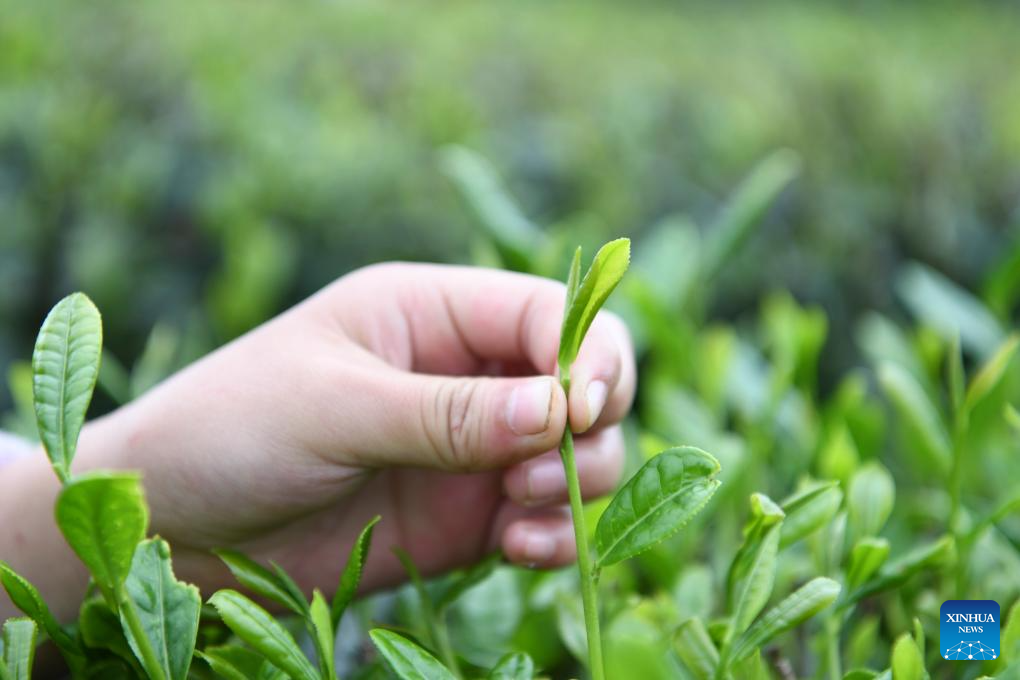
A farmer picks tea leaves at a tea garden in Erlong Village in Yuqing County, southwest China's Guizhou Province, April 5, 2024. During the Qingming Festival, tea farmers are engaged in the bustling activity of harvesting and processing spring tea in Yuqing County.
In recent years, Yuqing County has strategically positioned the tea industry as its pillar industry. Measures such as expanding cultivation areas, introducing processing enterprises, and extending the industry chain have been implemented to drive rural revitalization.
The efforts have yielded significant results, with the total area of tea plantations in Yuqing County now reaching 213,000 mu (approximately 14,200 hectares). More than 80,000 villagers have directly benefited from tea-related businesses with income increased. (Photo by He Chunyu/Xinhua)
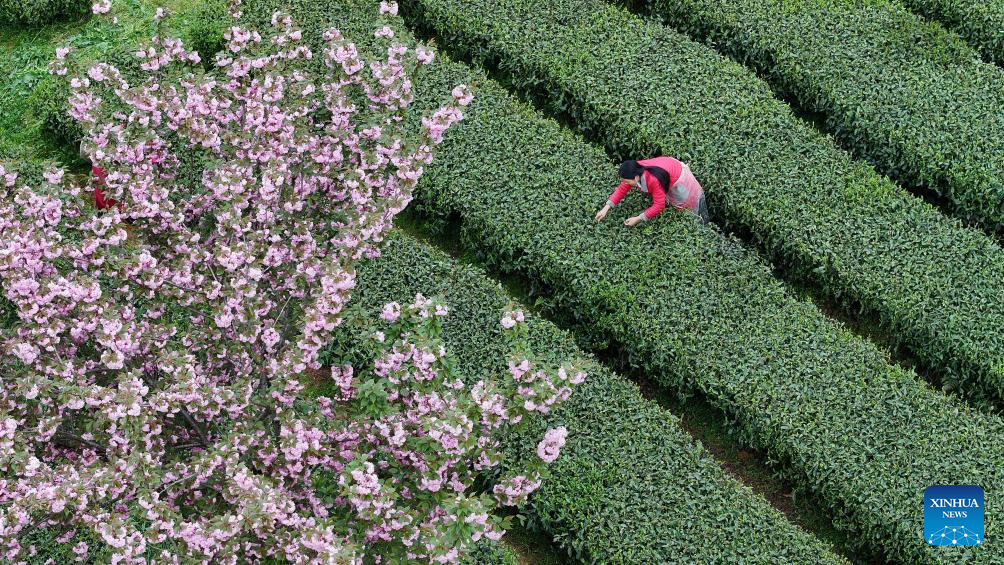
A drone photo shows a farmer picking tea leaves at a tea garden in Erlong Village in Yuqing County, southwest China's Guizhou Province, April 5, 2024. During the Qingming Festival, tea farmers are engaged in the bustling activity of harvesting and processing spring tea in Yuqing County.
In recent years, Yuqing County has strategically positioned the tea industry as its pillar industry. Measures such as expanding cultivation areas, introducing processing enterprises, and extending the industry chain have been implemented to drive rural revitalization.
The efforts have yielded significant results, with the total area of tea plantations in Yuqing County now reaching 213,000 mu (approximately 14,200 hectares). More than 80,000 villagers have directly benefited from tea-related businesses with income increased. (Photo by Wang Chao/Xinhua)
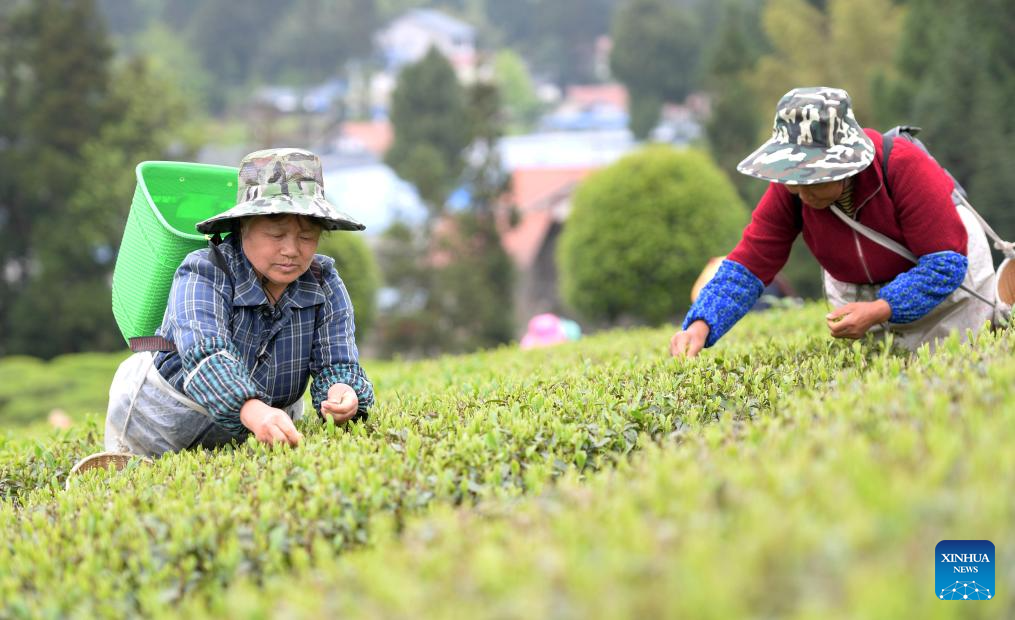
Farmers pick tea leaves at a tea garden in Erlong Village in Yuqing County, southwest China's Guizhou Province, April 5, 2024. During the Qingming Festival, tea farmers are engaged in the bustling activity of harvesting and processing spring tea in Yuqing County.
In recent years, Yuqing County has strategically positioned the tea industry as its pillar industry. Measures such as expanding cultivation areas, introducing processing enterprises, and extending the industry chain have been implemented to drive rural revitalization.
The efforts have yielded significant results, with the total area of tea plantations in Yuqing County now reaching 213,000 mu (approximately 14,200 hectares). More than 80,000 villagers have directly benefited from tea-related businesses with income increased. (Xinhua/Yang Ying)

A drone photo shows farmers picking tea leaves at tea gardens in Erlong Village in Yuqing County, southwest China's Guizhou Province, April 5, 2024. During the Qingming Festival, tea farmers are engaged in the bustling activity of harvesting and processing spring tea in Yuqing County.
In recent years, Yuqing County has strategically positioned the tea industry as its pillar industry. Measures such as expanding cultivation areas, introducing processing enterprises, and extending the industry chain have been implemented to drive rural revitalization.
The efforts have yielded significant results, with the total area of tea plantations in Yuqing County now reaching 213,000 mu (approximately 14,200 hectares). More than 80,000 villagers have directly benefited from tea-related businesses with income increased. (Xinhua/Yang Ying)
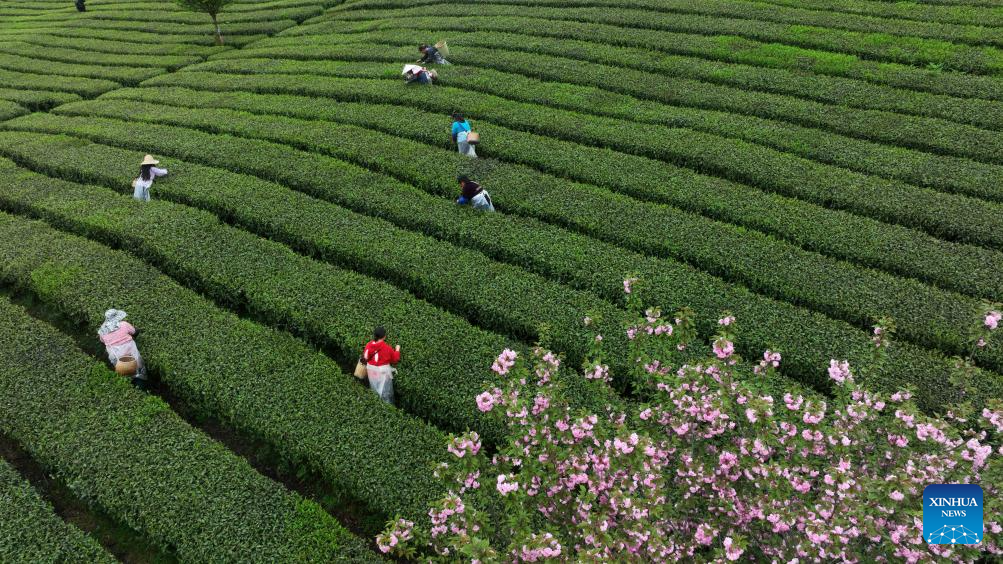
A drone photo shows farmers picking tea leaves at a tea garden in Erlong Village in Yuqing County, southwest China's Guizhou Province, April 5, 2024. During the Qingming Festival, tea farmers are engaged in the bustling activity of harvesting and processing spring tea in Yuqing County.
In recent years, Yuqing County has strategically positioned the tea industry as its pillar industry. Measures such as expanding cultivation areas, introducing processing enterprises, and extending the industry chain have been implemented to drive rural revitalization.
The efforts have yielded significant results, with the total area of tea plantations in Yuqing County now reaching 213,000 mu (approximately 14,200 hectares). More than 80,000 villagers have directly benefited from tea-related businesses with income increased. (Xinhua/Yang Ying)
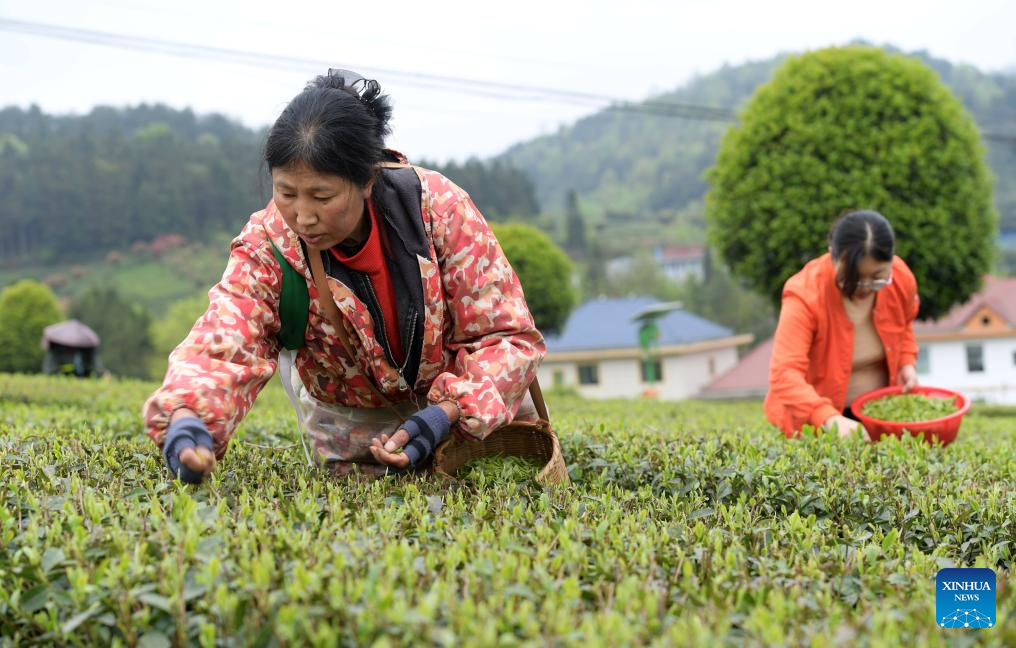
Farmers pick tea leaves at a tea garden in Erlong Village in Yuqing County, southwest China's Guizhou Province, April 5, 2024. During the Qingming Festival, tea farmers are engaged in the bustling activity of harvesting and processing spring tea in Yuqing County.
In recent years, Yuqing County has strategically positioned the tea industry as its pillar industry. Measures such as expanding cultivation areas, introducing processing enterprises, and extending the industry chain have been implemented to drive rural revitalization.
The efforts have yielded significant results, with the total area of tea plantations in Yuqing County now reaching 213,000 mu (approximately 14,200 hectares). More than 80,000 villagers have directly benefited from tea-related businesses with income increased. (Xinhua/Yang Ying)
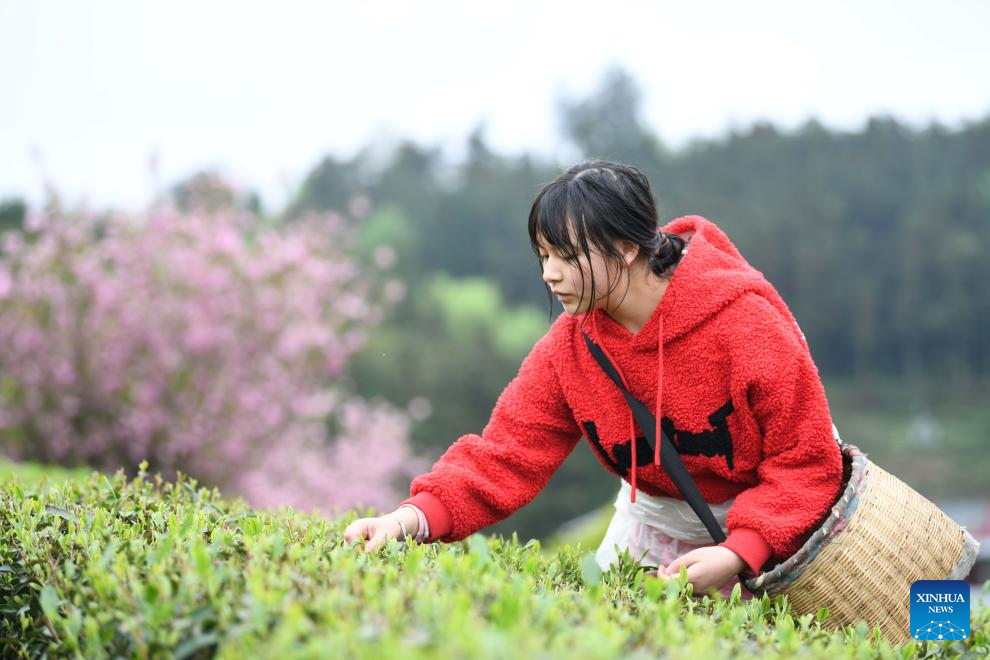
A farmer picks tea leaves at a tea garden in Erlong Village in Yuqing County, southwest China's Guizhou Province, April 5, 2024. During the Qingming Festival, tea farmers are engaged in the bustling activity of harvesting and processing spring tea in Yuqing County.
In recent years, Yuqing County has strategically positioned the tea industry as its pillar industry. Measures such as expanding cultivation areas, introducing processing enterprises, and extending the industry chain have been implemented to drive rural revitalization.
The efforts have yielded significant results, with the total area of tea plantations in Yuqing County now reaching 213,000 mu (approximately 14,200 hectares). More than 80,000 villagers have directly benefited from tea-related businesses with income increased. (Photo by Wang Chao/Xinhua)
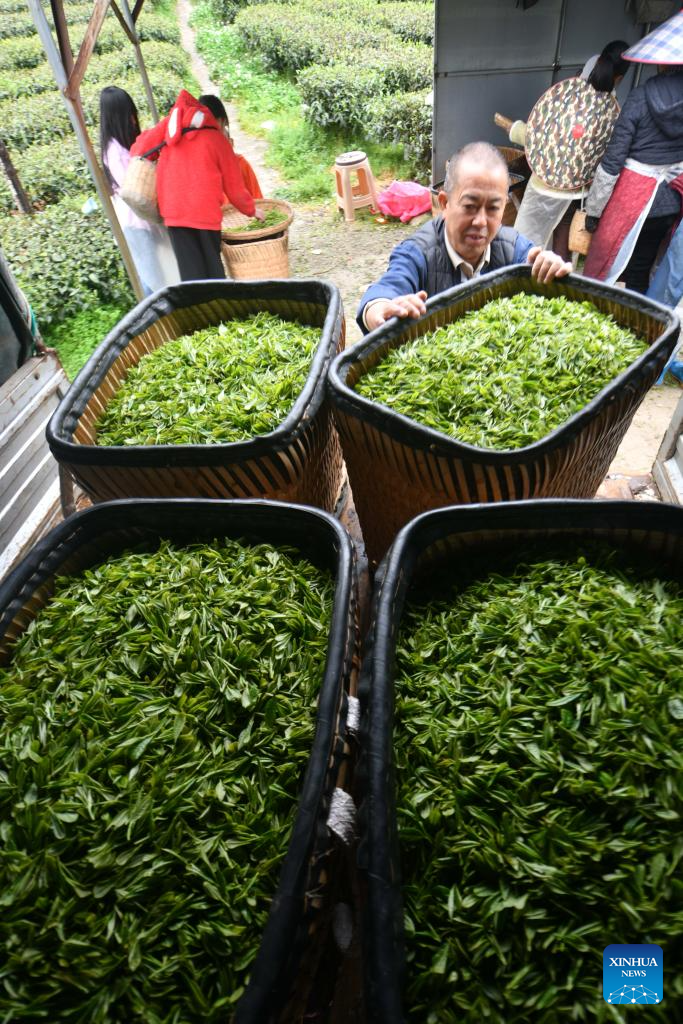
Farmers load fresh tea leaves onto a lorry at a tea garden in Erlong Village in Yuqing County, southwest China's Guizhou Province, April 5, 2024. During the Qingming Festival, tea farmers are engaged in the bustling activity of harvesting and processing spring tea in Yuqing County.
In recent years, Yuqing County has strategically positioned the tea industry as its pillar industry. Measures such as expanding cultivation areas, introducing processing enterprises, and extending the industry chain have been implemented to drive rural revitalization.
The efforts have yielded significant results, with the total area of tea plantations in Yuqing County now reaching 213,000 mu (approximately 14,200 hectares). More than 80,000 villagers have directly benefited from tea-related businesses with income increased. (Photo by Liang Wen/Xinhua)
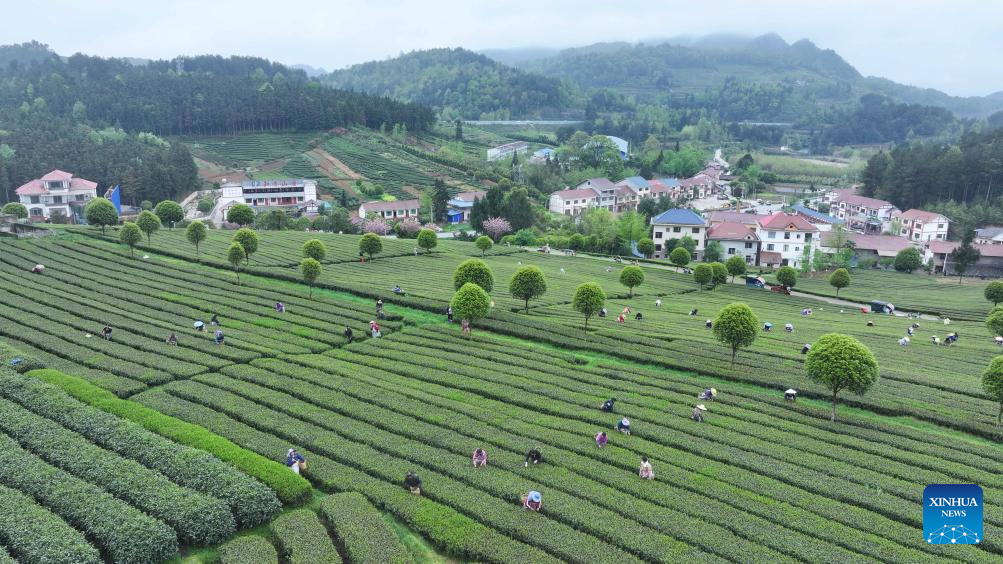
A drone photo shows farmers picking tea leaves at tea gardens in Erlong Village in Yuqing County, southwest China's Guizhou Province, April 5, 2024. During the Qingming Festival, tea farmers are engaged in the bustling activity of harvesting and processing spring tea in Yuqing County.
In recent years, Yuqing County has strategically positioned the tea industry as its pillar industry. Measures such as expanding cultivation areas, introducing processing enterprises, and extending the industry chain have been implemented to drive rural revitalization.
The efforts have yielded significant results, with the total area of tea plantations in Yuqing County now reaching 213,000 mu (approximately 14,200 hectares). More than 80,000 villagers have directly benefited from tea-related businesses with income increased. (Photo by Wang Chao/Xinhua)
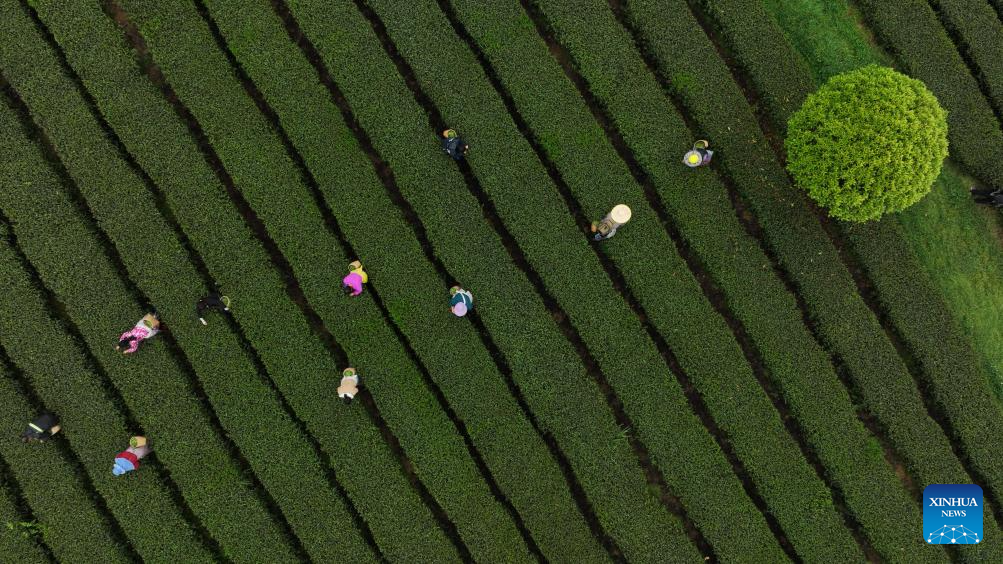
An aerial drone photo shows farmers picking tea leaves at a tea garden in Erlong Village in Yuqing County, southwest China's Guizhou Province, April 5, 2024. During the Qingming Festival, tea farmers are engaged in the bustling activity of harvesting and processing spring tea in Yuqing County.
In recent years, Yuqing County has strategically positioned the tea industry as its pillar industry. Measures such as expanding cultivation areas, introducing processing enterprises, and extending the industry chain have been implemented to drive rural revitalization.
The efforts have yielded significant results, with the total area of tea plantations in Yuqing County now reaching 213,000 mu (approximately 14,200 hectares). More than 80,000 villagers have directly benefited from tea-related businesses with income increased. (Xinhua/Yang Ying)
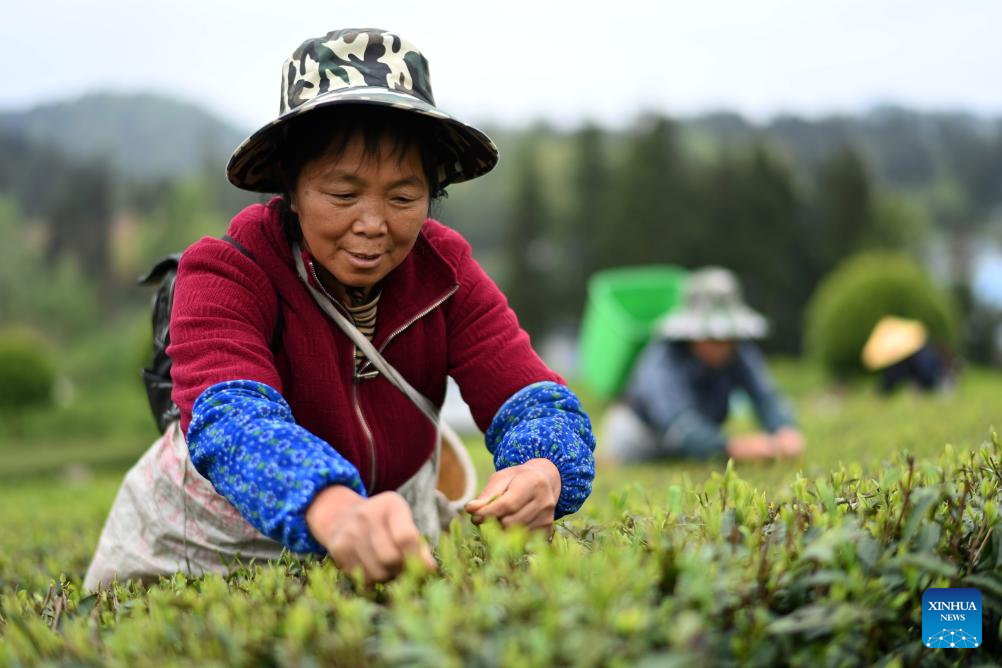
A farmer picks tea leaves at a tea garden in Erlong Village in Yuqing County, southwest China's Guizhou Province, April 5, 2024. During the Qingming Festival, tea farmers are engaged in the bustling activity of harvesting and processing spring tea in Yuqing County.
In recent years, Yuqing County has strategically positioned the tea industry as its pillar industry. Measures such as expanding cultivation areas, introducing processing enterprises, and extending the industry chain have been implemented to drive rural revitalization.
The efforts have yielded significant results, with the total area of tea plantations in Yuqing County now reaching 213,000 mu (approximately 14,200 hectares). More than 80,000 villagers have directly benefited from tea-related businesses with income increased. (Xinhua/Yang Ying)
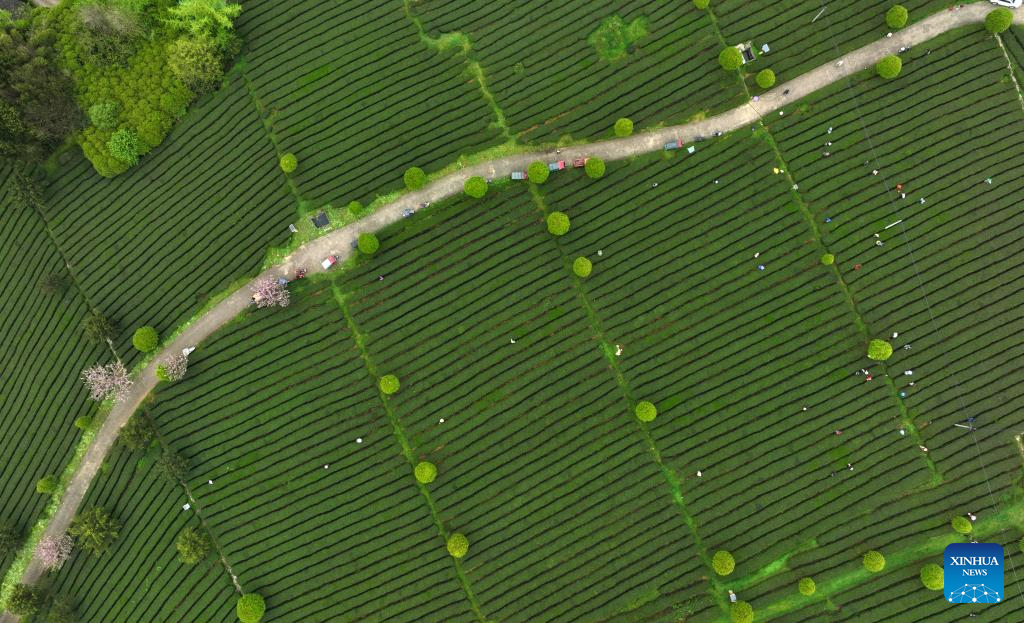
An aerial drone photo shows farmers picking tea leaves at tea gardens in Erlong Village in Yuqing County, southwest China's Guizhou Province, April 5, 2024. During the Qingming Festival, tea farmers are engaged in the bustling activity of harvesting and processing spring tea in Yuqing County.
In recent years, Yuqing County has strategically positioned the tea industry as its pillar industry. Measures such as expanding cultivation areas, introducing processing enterprises, and extending the industry chain have been implemented to drive rural revitalization.
The efforts have yielded significant results, with the total area of tea plantations in Yuqing County now reaching 213,000 mu (approximately 14,200 hectares). More than 80,000 villagers have directly benefited from tea-related businesses with income increased. (Xinhua/Yang Ying)
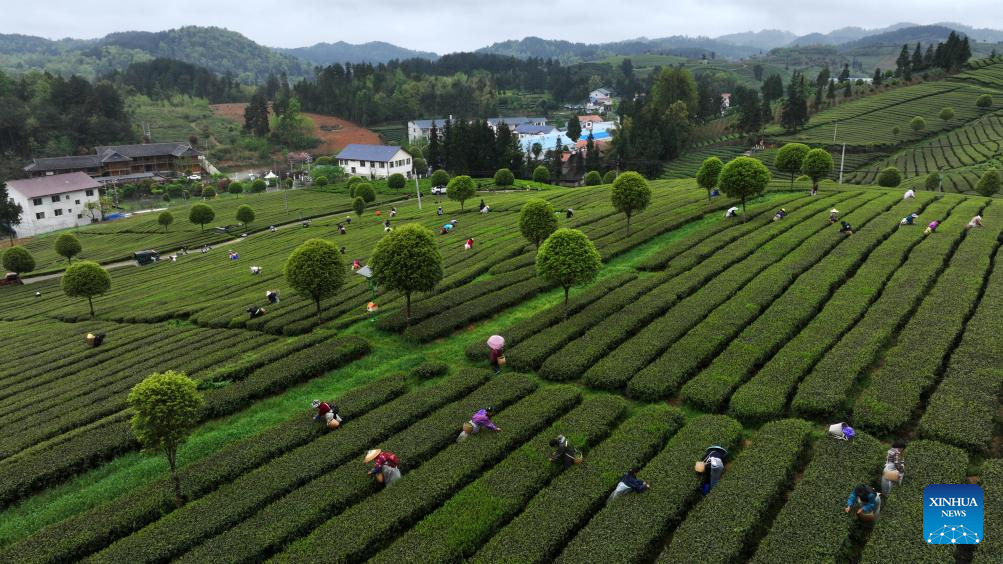
A drone photo shows farmers picking tea leaves at tea gardens in Erlong Village in Yuqing County, southwest China's Guizhou Province, April 5, 2024. During the Qingming Festival, tea farmers are engaged in the bustling activity of harvesting and processing spring tea in Yuqing County.
In recent years, Yuqing County has strategically positioned the tea industry as its pillar industry. Measures such as expanding cultivation areas, introducing processing enterprises, and extending the industry chain have been implemented to drive rural revitalization.
The efforts have yielded significant results, with the total area of tea plantations in Yuqing County now reaching 213,000 mu (approximately 14,200 hectares). More than 80,000 villagers have directly benefited from tea-related businesses with income increased. (Xinhua/Yang Ying)
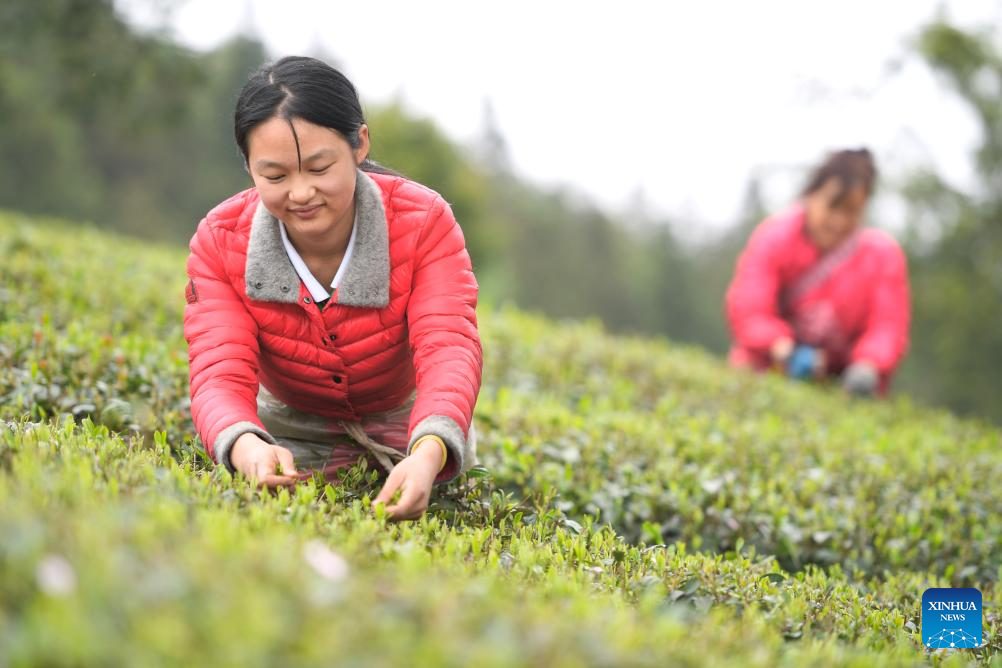
Farmers pick tea leaves at a tea garden in Erlong Village in Yuqing County, southwest China's Guizhou Province, April 5, 2024. During the Qingming Festival, tea farmers are engaged in the bustling activity of harvesting and processing spring tea in Yuqing County.
In recent years, Yuqing County has strategically positioned the tea industry as its pillar industry. Measures such as expanding cultivation areas, introducing processing enterprises, and extending the industry chain have been implemented to drive rural revitalization.
The efforts have yielded significant results, with the total area of tea plantations in Yuqing County now reaching 213,000 mu (approximately 14,200 hectares). More than 80,000 villagers have directly benefited from tea-related businesses with income increased. (Xinhua/Yang Ying)

Children experience picking tea leaves at a tea garden in Erlong Village in Yuqing County, southwest China's Guizhou Province, April 5, 2024. During the Qingming Festival, tea farmers are engaged in the bustling activity of harvesting and processing spring tea in Yuqing County.
In recent years, Yuqing County has strategically positioned the tea industry as its pillar industry. Measures such as expanding cultivation areas, introducing processing enterprises, and extending the industry chain have been implemented to drive rural revitalization.
The efforts have yielded significant results, with the total area of tea plantations in Yuqing County now reaching 213,000 mu (approximately 14,200 hectares). More than 80,000 villagers have directly benefited from tea-related businesses with income increased. (Photo by Wang Chao/Xinhua)
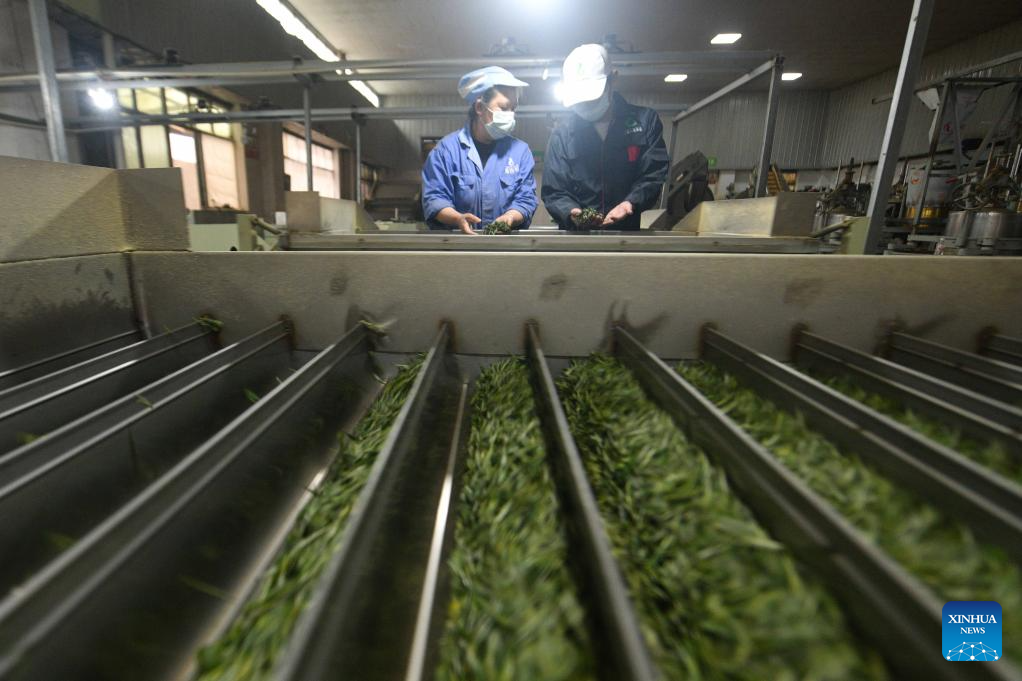
Workers process tea leaves at a tea processing enterprise in Erlong Village in Yuqing County, southwest China's Guizhou Province, April 5, 2024. During the Qingming Festival, tea farmers are engaged in the bustling activity of harvesting and processing spring tea in Yuqing County.
In recent years, Yuqing County has strategically positioned the tea industry as its pillar industry. Measures such as expanding cultivation areas, introducing processing enterprises, and extending the industry chain have been implemented to drive rural revitalization.
The efforts have yielded significant results, with the total area of tea plantations in Yuqing County now reaching 213,000 mu (approximately 14,200 hectares). More than 80,000 villagers have directly benefited from tea-related businesses with income increased. (Photo by Liang Wen/Xinhua)